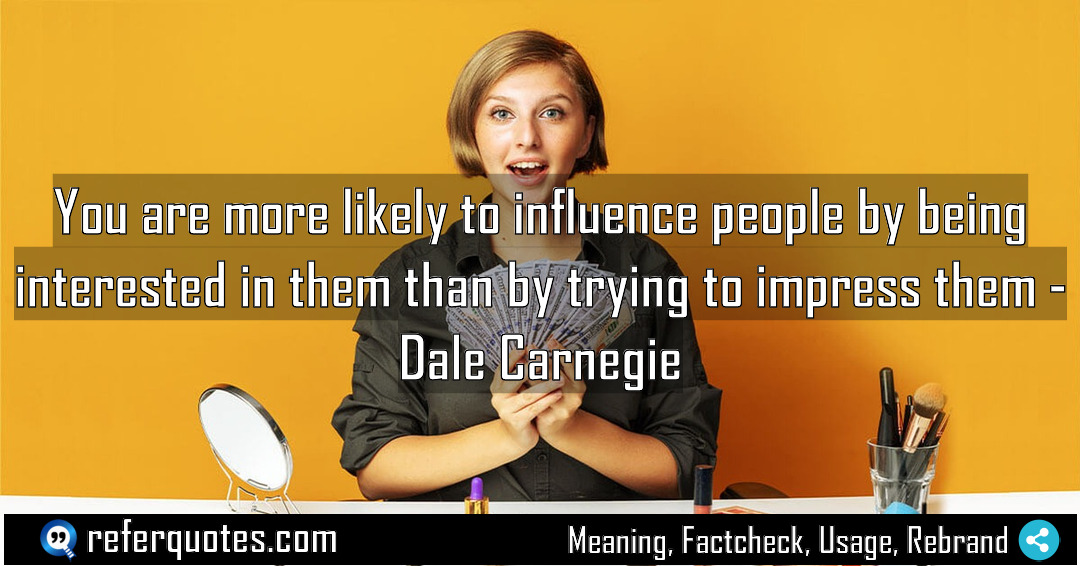
You are more likely to influence people… by shifting the focus from your own ego to their interests. It’s a simple but profound flip of the script.
Share Image Quote:
Table of Contents
Meaning
The core message is that genuine curiosity about others is a far more potent tool for influence than any attempt to showcase your own accomplishments or intelligence.
Explanation
Look, I’ve seen this play out for years. We’re all hardwired to care about our own lives, our own problems, our own stories. When you walk into a room trying to impress people, you’re essentially asking them to pay attention to your broadcast. And everyone is already tuned into their own station.
But when you flip it—when you become genuinely interested in their broadcast—you do something powerful. You validate them. You make them feel important. And that creates a psychological pull, a sense of connection and obligation that is infinitely more effective than pushing your own agenda. It’s not a tactic, it’s a fundamental reorientation of how you approach relationships.
Quote Summary
Reading Level40
Aesthetic Score72
Origin & Factcheck
This is straight from Dale Carnegie’s legendary book, How to Win Friends and Influence People, first published in the United States in 1936. You’ll sometimes see similar sentiments floating around, but this is the original, definitive source. The principle is a cornerstone of his entire philosophy.
Attribution Summary
Author Bio
Dale Carnegie(1888), an American writer received worldwide recognition for his influential books on relationship, leadership, and public speaking. His books and courses focus on human relations, and self confidence as the foundation for success. Among his timeless classics, the Dale Carnegie book list includes How to Win Friends and Influence People is the most influential which inspires millions even today for professional growth.
Official Website |Facebook | X | Instagram | YouTube |
Where is this quotation located?
| Quotation | You are more likely to influence people by being interested in them than by trying to impress them |
| Book Details | Publication Year/Date: 1936 original, Revised Edition 1981, ISBN/Unique Identifier: 9780671723651, Last edition. Number of pages: Revised Edition 1981, approx 291 pages |
| Where is it? | Part Two: Six Ways to Make People Like You, Chapter 1 |
Context
In the book, this idea isn’t presented as a standalone trick. It’s part of a core section titled “Six Ways to Make People Like You.” It comes right after principles like becoming genuinely interested in other people and smiling. Carnegie frames it as the antidote to the common, self-defeating habit of talking too much about ourselves in social and business situations.
Usage Examples
So how does this work in the real world? It’s all about the questions you ask.
- In a Sales Pitch: Instead of leading with your product’s ten best features, start by asking the prospect about their biggest current challenge. Let them talk. Your features then become the solution to their problem.
- Networking at an Event: Ditch the elevator pitch. Ask someone, “What’s exciting you about your work right now?” or “What brought you to this event?” Listen to the answer. The connection you build will be stronger than any business card exchange.
- Managing a Team: Before assigning a task, understand your team member’s interests and career goals. Frame the work in a way that aligns with what they care about. You’ll get buy-in, not just compliance.
This is gold for leaders, salespeople, marketers, coaches, anyone who needs to build rapport and get others to see their point of view.
To whom it appeals?
Share This Quote Image & Motivate
Motivation Score82
Popularity Score88
Shareability Score84
Common Questions
Question: Isn’t this just being manipulative?
Answer: Only if it’s fake. The magic is in the genuineness. If you’re just going through the motions, people will sense it. The goal is to cultivate a real, authentic curiosity.
Question: What if the other person just talks about themselves the whole time?
Answer: Let them! In that scenario, you’ve already won. They will leave the conversation feeling heard and positive about the interaction, which is a huge win for influence.
Question: How do I balance being interested with still getting my point across?
Answer: It’s a dance, not a monologue. You listen, you ask a follow-up question, and then you might say, “That’s fascinating. It actually reminds me of something I’ve been working on that could help with…” You bridge their world to yours.
Question: Does this work in every culture?
Answer: The core principle is universal—people want to feel valued. However, the way you show interest (directness of questions, topics discussed) should be adapted to cultural norms.
Similar Quotes
Don’t try to impress people; interest them instead. It’s a simple shift in mindset that completely transforms how you connect, moving you from a performer to a partner in the…
Don’t aim to impress people. Aim to connect with them. It’s a simple mindset shift that completely changes how you build relationships, both personally and professionally. Let’s break down why…
When you encourage others, you’re not just giving a pat on the back. You’re activating a powerful two-way street that builds their confidence and, almost like magic, expands your own…
Charm is not about impressing people. It’s about making them feel impressed with themselves. This single idea flips traditional networking on its head, transforming it from a performance into a…
You know, the only way to influence people is to talk about what they want. It sounds simple, but it’s the secret sauce I’ve seen work in sales, leadership, and…
